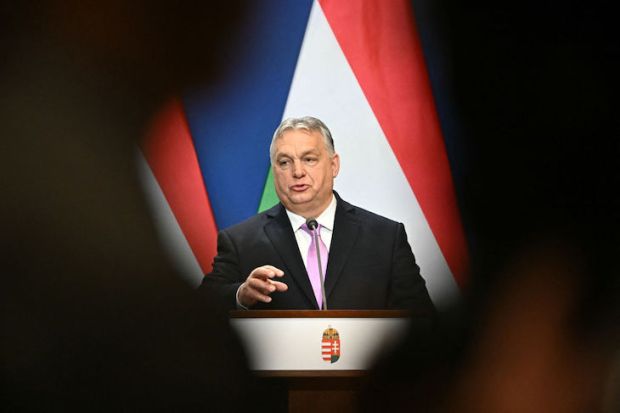You know those stories about how the EU is banning busty barmaids or Bombay mix that turn out to have an estranged relationship with the truth? This isn’t one of them. On its face, the headline ‘Palestinian terrorists can legally take part in EU-funded activities’ seems so absurd as to be obviously false. Yet the Jerusalem Post’s Lahav Harkov has obtained a letter from Sven Kühn von Burgsdorff, head of the EU’s Palestinian delegation, which appears to advise on loopholes to Brussels’ terrorist blacklist.
The missive, addressed to Palestinian NGOs, is said to clarify the terms of CFSP 2019/1341, the EU’s listing of individuals and groups to be forbidden financial assistance under the community’s programme of ‘specific measures to combat terrorism’. This comes after Palestinian lobbying to lift the ban on the grounds that terrorist bodies like the Popular Front for the Liberation of Palestine are actually political parties. While von Burgsdorff did not indicate any change in Brussels’ stance, he reportedly wrote:
While the entities and groups included in the EU restrictive lists cannot benefit from EU-funded activities, it is understood that a natural person affiliated to, sympathizing with or supporting any of the groups or entities mentioned in the EU restrictive lists is not excluded from benefiting from EU-funded activities, unless his/her exact name and surname… corresponds to any of the natural persons on the EU restrictive list.
According to the Post, the letter goes on to note that ‘the EU does not ask any civil society organization to change its political position towards any Palestinian faction or to discriminate against any natural person based on his/her political affiliation’. The revelation of the memo has caused a diplomatic stir in Jerusalem, with the EU’s representative summoned for a ticking-off, though Brussels has insisted ‘EU support is subject to stringent and permanent monitoring and both ex-ante and ex-post verification’.
It’s up to the EU how it spends its taxpayers’ money but this is an organisation that denies Israeli universities funding for archaeological digs in eastern Jerusalem. Tel Aviv anthropologists should declare themselves in political sympathy with the settlers and demand their own letter from von Burgsdorff.
EU contempt for Israel is nothing new but it is still damnable. Just as damnable is Brussels’ normalising of the very behaviour that keeps the Palestinians stateless. Withholding funds from a blacklist of organisations while highlighting the loophole that allows affiliates or sympathisers to benefit from those funds turns counter-terrorism into an exercise in legal gymnastics. Drop your AK47 only long enough to jump through this hoop.
There is no law, written or unwritten, that says Palestinian society has to tolerate extremism or to include in its institutions and civic programmes those in sympathy with terrorism. Of course, as with all conflicts, you have to tolerate a certain degree of bastardry if you want to make peace, but the EU is not making peace or even the pre-conditions for it. Brussels simply factors in Palestinian extremism because, in the eyes of the EU’s foreign policy apparatus, that’s just who the Palestinians are. The Palestinians need — and, frankly, deserve — better patrons than this. Not guilt-ridden liberals who believe extremists have the same stake in the future as peaceable Palestinians, but honest friends who say that peaceable Palestinians have no future until the stake of the extremists is meaningfully reduced.
It’s easy for Britons to roll their eyes at the EU’s behaviour and mutter ‘we’re well out of it’, but on Middle East policy the UK has hardly Brexited at all. Whitehall’s view of Israel and the threats it faces is entirely in lockstep with that of Brussels. Last week, when a gaggle of EU states put out a haughty warning to Jerusalem about applying its sovereignty to Israeli settlements, the UK was a dutiful little echo. Whatever the wisdom of Benjamin Netanyahu’s intention, it was taken to an election, is the policy of a bipartisan government, accords with the US peace plan, and is the position of the UK’s most reliable ally in a strategically vital region. As it finds its feet in a post-Brexit world, the UK will come to appreciate that its interests, increasingly unaligned to those of the EU, are ill-served by an international stance shaped by outdated assumptions about our future in Europe. We are an independent nation and need an independent foreign policy.
Got something to add? Join the discussion and comment below.
Get 10 issues for just $10
Subscribe to The Spectator Australia today for the next 10 magazine issues, plus full online access, for just $10.




















Comments
Don't miss out
Join the conversation with other Spectator Australia readers. Subscribe to leave a comment.
SUBSCRIBEAlready a subscriber? Log in